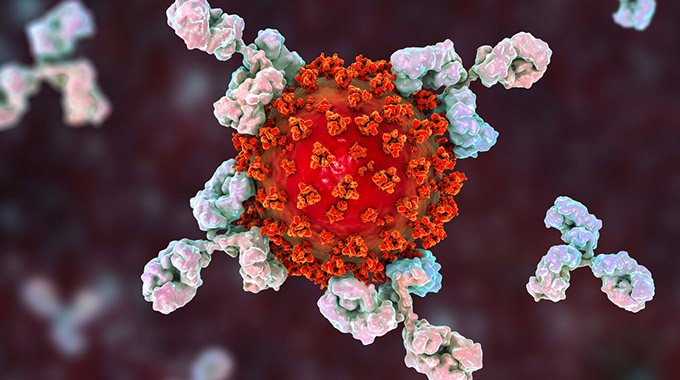JUST IN: Africa CDC maps regional spread of new Covid-19 variants

Roselyne Sachiti
Features, Health and Society Editor
- Africa CDC to provide technical guidance for genomic surveillance of SARS-CoV-2 in Africa, and ensure quality-assured sequencing by specialised laboratories and regional laboratory hubs; and strengthen the capacity of national and regional laboratories to effectively respond to the emerging sequencing needs
- There is currently limited data on the extent to which these new variants have spread in Africa, but preliminary data show that the 501Y.V2 variant has been reported in 22 countries globally including South Africa, Ghana, Botswana and Zambia
The Africa Centres for Disease Control and Prevention (Africa CDC) on Friday said it is working with partners and Member States to map the regional spread of the new variants in Africa through regional genomic surveillance.
In a statement, the Africa CDC also said they are also supporting laboratory centres of excellence to address the emerging SARS-CoV-2 sequencing needs of Member States and ensure availability of geographically representative and timely data.
The Africa CDC further revealed that it will provide technical guidance for genomic surveillance of SARS-CoV-2 in Africa, and ensure quality-assured sequencing by specialised laboratories and regional laboratory hubs; and strengthen the capacity of national and regional laboratories to effectively respond to the emerging sequencing needs.
Africa is currently experiencing an increase in the number of confirmed COVID-19 cases.
As of 27 January 2021, according to Africa CDC, at least 40 countries have experienced a second wave of the pandemic, including all countries in the Southern Africa region.
This new wave of infections is thought to be associated with the emergence of variants that are more transmissible.
Preliminary findings show that three new similar but distinct Severe Acute Respiratory Syndrome Coronavirus 2 (SARS-CoV-2) variants, the 501Y/VUI – 202012/01, 501Y.V2, 501Y.V3, reported in the United Kingdom, South Africa
and Brazil, respectively, are significantly more transmissible than previously circulating variants, with high viral shedding observed among cases.
According to the Africa CDC, there is currently limited data on the extent to which these new variants have spread in Africa, but preliminary data show that the 501Y.V2 variant has been reported in 22 countries globally including South Africa, Ghana, Botswana and Zambia.
“The anticipated consequences of the new SARS-CoV-2 variants on available diagnostic tools:
Nucleic acid amplification tests (NAATs)
Mutations of the 501Y.V2 variants have been mapped in the spike protein (S-gene), including K417T, E484K, N501Y; however, unlike the 501Y, this variant does not contain the deletion at positions 69-70. NAAT assays designed to detect multiple targets are less susceptible to genetic variation than assays designed to target a single gene,” Africa CDC further said.
According to Africa CDC, currently, there are no assays approved through the WHO Emergency Use Listing (EUL) procedure that targets only the S-gene.
“There are also two NAATs on the WHO EUL which include S-gene targets: Thermo Fisher TaqPath COVID-19 and Primerdesign genesig® Z-Path COVID-19 CE. As both assays have multiple gene targets, the overall test sensitivity should not be impacted, which is consistent with manufacturer claims.”
Africa CDC said the WHO prequalification
and post-market surveillance teams will continue to monitor the situation.
“Irrespective of which NAAT assay is used to diagnose SARS-CoV-2, it is important to monitor target failure rates; this may be a signal that a new variant is present, or can be important to trigger other quality control measures. Available data have no detailed information,” the statement added.
According to Africa CDC, the majority of commercially available Antigen rapid diagnostic tests (Ag RDTs) target the nucleocapsid (N) protein, including the two tests that have been approved through the WHO EUL procedure: Abbott Panbio and SD Biosensor STANDARD Q. Based on the mutation profiles of the emerging variants, it is not anticipated that the performance of Ag RDTs will be impacted. Initial data from Public Health England shows that 5 Ag RDTs can detect the 501Y variant3
There are also ongoing studies using Abbott Panbio and SD Biosensor STANDARD Q to confirm that their performance is maintained for detection of the novel variants.
Antibody/serology tests
The Africa CDC said antibody tests do not directly detect the virus, they rather detect the body’s immune response, therefore, the
impact of the novel variants on test performance is not as well-defined.
“Because the majority of the variant mutations are in the spike protein, there remains a risk that assays that detect S-specific antibodies may be
particularly affected, but limited data has been generated. Studies are ongoing to identify assays that may be impacted by these mutations,”.
In conclusion, the Africa CDC said NAAT assays that use multiple genetic targets are less likely to be impacted by genetic variants.
“For assays with S-gene targets, be aware of patterns showing S-gene dropout (lack of detection of the S-gene target, specifically the pattern of 2/3 positive targets for TaqPath and 1/2 positive targets for Primer design).
“Samples with these patterns should be considered for further characterization by genetic sequencing. If sequencing is not readily available in-country, the laboratory should consider reaching out to Africa CDC at [email protected] for additional information.”










Comments